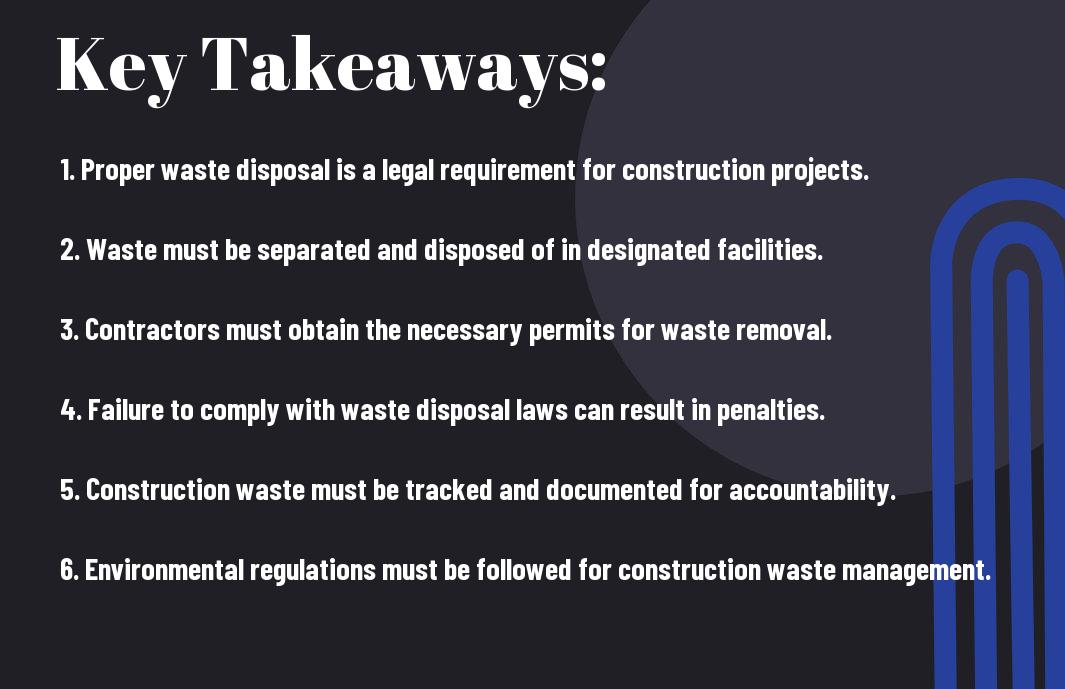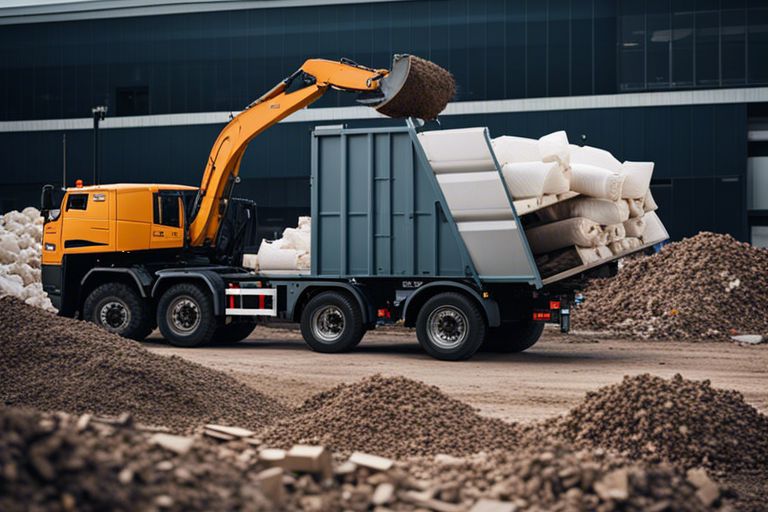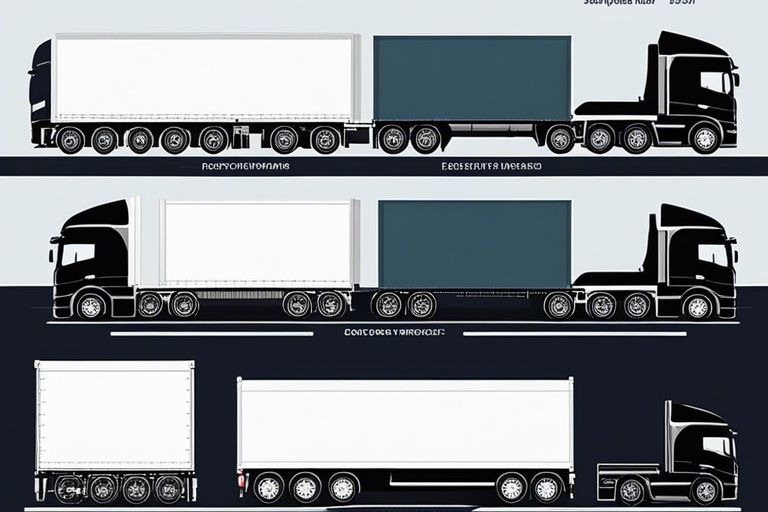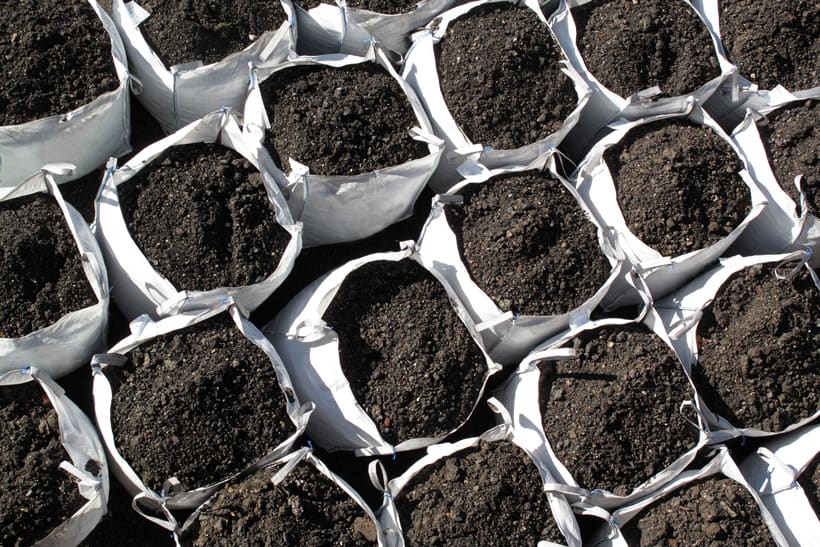Obtaining proper permits and compliance for the removal of construction waste is a crucial aspect of any building project in the UK. Failure to adhere to the necessary regulations can result in hefty fines and legal consequences for individuals and companies involved. Understanding the legal requirements for disposing of construction waste is essential to ensure the safety of workers, the public, and the environment. In this informative blog post, we will delve into the key legalities surrounding construction waste removal in the UK, including the proper disposal methods, permits, and documentation required. Additionally, we will highlight the potential hazards associated with improper waste removal, as well as the positive impact of adhering to the legalities.
Key Takeaways:
- Regulations: The UK has strict regulations in place for the removal and disposal of construction waste. It is important for construction companies to be aware of and comply with these regulations to avoid potential legal implications.
- Waste Management Plans: Construction companies must develop comprehensive waste management plans to ensure the proper handling and disposal of construction waste. This includes identifying designated waste disposal sites and implementing measures to minimise waste generation.
- Penalties: Failure to comply with the legalities of construction waste removal in the UK can result in severe penalties, including fines and legal action. It is crucial for construction companies to take the necessary steps to adhere to the regulations and avoid potential consequences.

Legislation Governing Construction Waste Removal
When it comes to the removal of construction waste in the UK, there are several key pieces of legislation that must be adhered to in order to ensure compliance with the law.
The Environmental Protection Act 1990
The Environmental Protection Act 1990 is a crucial piece of legislation that sets out the legal framework for the handling and disposal of construction waste in the UK. This Act places a duty of care on those involved in the production, transportation, and disposal of waste to ensure that it is managed properly and does not cause harm to human health or the environment. Failure to comply with this Act can result in significant fines and even imprisonment for those found to be in breach of its provisions.
Under this Act, businesses and individuals have a responsibility to ensure that their waste is stored, transported, and disposed of in a safe and environmentally friendly manner. This includes keeping accurate records of waste produced and transferred, as well as taking all necessary measures to prevent pollution and harm to the environment.
The Waste (England and Wales) Regulations 2011
The Waste (England and Wales) Regulations 2011 further build upon the framework set out in the Environmental Protection Act 1990, with a specific focus on the management of waste in England and Wales. These regulations outline the requirements for the collection, transport, and disposal of waste, as well as the responsibilities of waste holders, carriers, and disposal site operators. Compliance with these regulations is essential for anyone involved in the construction industry, as failure to do so can lead to substantial penalties and reputational damage.
Key provisions of these regulations include the requirement to classify waste, keep appropriate documentation, and ensure that waste is only transferred to authorised individuals or facilities. Additionally, the regulations set out specific guidelines for the treatment and recovery of waste, with the aim of promoting a more sustainable approach to waste management.
It is essential for businesses and individuals involved in construction waste removal to familiarise themselves with the key legislations such as The Environmental Protection Act 1990 and The Waste (England and Wales) Regulations 2011, in order to avoid severe penalties and legal consequences. Failure to comply with these laws can result in significant fines and even imprisonment, as well as reputational damage and loss of business opportunities.
Duty of Care under the Environmental Protection Act
The duty of care under the Environmental Protection Act requires that any individual or business that produces, imports, carries, keeps, treats, or disposes of controlled waste must take all reasonable measures to ensure that the waste is managed appropriately. This duty extends to anyone who is involved in the chain of waste management, from its production to its final disposal.
Under this duty of care, it is crucial for waste producers to accurately describe the waste, ensure it is transferred only to authorised individuals or facilities, and keep records of all waste transactions. This duty also requires waste producers to take all reasonable measures to prevent the escape of waste and to ensure that it is properly managed and, where possible, recovered or recycled.
Waste Management Practices
When it comes to construction waste removal in the UK, proper waste management practices are crucial to ensure compliance with the law and to minimise the environmental impact. One important aspect of waste management in construction is materials storage and waste management. It is essential for construction sites to have designated areas for storing materials and managing waste to prevent hazardous substances from polluting the environment.
Waste Hierarchy and Sustainable Practices
Adhering to the waste hierarchy is key in construction waste removal, with a focus on reducing, reusing, and recycling materials whenever possible. By implementing sustainable practices, such as segregating waste at the source and choosing environmentally friendly disposal methods, construction companies can significantly reduce their environmental footprint and minimise the amount of waste sent to landfill sites.
Licensing and Permits for Waste Carriers
Construction waste carriers in the UK are required to hold the appropriate licences and permits to legally transport and dispose of waste. This helps to ensure that waste is handled responsibly and does not end up being illegally dumped or fly-tipped, posing serious environmental and public health hazards. It is important for construction companies to verify the legitimacy of waste carriers they engage with to avoid any legal liabilities.
Construction companies should also be aware of the duty of care requirements when transferring waste to licensed carriers, as failing to do so can result in hefty fines and potential prosecution. By staying informed about the licensing and permit regulations for waste carriers, construction firms can demonstrate their commitment to legal and ethical waste removal practices.

Responsibilities and Penalties
When it comes to construction waste removal in the UK, there are specific responsibilities that fall upon the duty holder. These responsibilities are legally binding and failure to comply can result in severe penalties. It is crucial for all involved parties to understand and adhere to these responsibilities to avoid any legal repercussions.
Obligations of the Duty Holder
The duty holder, usually the person or company in control of the construction site, is responsible for ensuring that all construction waste is appropriately managed and disposed of. This includes obtaining the necessary permits and consents for waste disposal, as well as keeping detailed records of the waste produced and where it is sent for disposal or recycling. It is also the duty holder’s responsibility to ensure that all relevant staff receive proper training and follow correct procedures for waste management.
Consequences of Non-compliance
Failure to comply with the legal obligations regarding construction waste removal can result in a range of consequences. These may include fines, legal action, and even imprisonment in severe cases. The Environment Agency has the authority to carry out inspections and investigations to ensure compliance, and they have the power to impose hefty penalties on those found to be in breach of the regulations.
Non-compliance with waste removal regulations not only has serious legal implications, but it can also have detrimental effects on the environment and public health. Proper waste management is essential to prevent pollution and protect natural resources, and it is the legal duty of all parties involved in construction projects to ensure compliance with waste removal regulations.

Case Studies and Best Practices
In this section, we will delve into case studies where successful waste removal plans and innovations in waste management have been implemented in the UK construction industry. These real-life examples will provide data and insight into best practices for construction waste removal.
- 1. Company X: Reduced construction waste by 30% through effective segregation and recycling efforts.
- 2. Project Y: Implemented a comprehensive waste management plan, achieving a 50% reduction in landfill waste.
- 3. Development Z: Utilised advanced technology for waste tracking, leading to a 40% decrease in overall waste generated.
Successful Implementation of Waste Removal Plans
Companies that have successfully implemented waste removal plans have seen significant benefits, not only in terms of environmental sustainability but also cost savings. By prioritising waste segregation at source, efficient recycling processes, and regular monitoring, these organisations have set a benchmark for others to follow. It is crucial for construction companies to learn from these examples and adopt similar strategies to minimise waste generation and maximise resource recovery.
Innovations in Construction Waste Management
Recent years have seen remarkable innovations in construction waste management, from digital waste tracking systems to advanced recycling technologies. These innovations not only streamline the waste management process but also enhance transparency and accountabilitycutting-edge solutions can revolutionise the way construction waste is handled and pave the way for a sustainable future in the industry.
As the construction industry continues to evolve, it is imperative for companies to embrace these innovations in waste management for a more sustainable and efficient approach to waste removal. By integrating advanced technologies and adopting best practices from successful case studies, organisations can significantly reduce their environmental footprint and contribute to a greener, cleaner future.
The Legalities of Construction Waste Removal in the UK
In conclusion, understanding the legalities of construction waste removal in the UK is crucial for all construction companies and waste management providers. It is imperative to adhere to the regulations set forth by the Environment Agency and other governing bodies to ensure that construction waste is disposed of properly and responsibly. Failure to comply with these legal requirements can result in severe penalties and harm to the environment. Therefore, it is essential for all parties involved in construction waste removal to stay informed about the latest regulations and ensure that they are properly managing and disposing of construction waste in accordance with the law.
FAQ
Q: What regulations govern construction waste removal in the UK?
A: Construction waste removal in the UK is governed by the Environmental Protection Act 1990 and the Construction (Design and Management) Regulations 2015.
Q: What are the legal obligations for construction waste disposal in the UK?
A: Construction companies are legally obligated to ensure that waste is managed and disposed of in a safe and environmentally friendly manner, in compliance with the law.
Q: Are there specific permits required for construction waste removal in the UK?
A: Yes, a Waste Carrier’s Licence is required for anyone transporting construction waste, and a permit may be needed for operating a waste disposal site.
Q: What are the penalties for not complying with construction waste removal regulations in the UK?
A: Failure to comply with regulations can result in fines, legal action, and reputational damage for construction companies, as well as harm to the environment and public health.
Q: How can construction companies ensure legal compliance with waste removal in the UK?
A: Construction companies can ensure compliance by working with licensed waste carriers, keeping accurate waste transfer documentation, and implementing proper waste management practices on-site.







